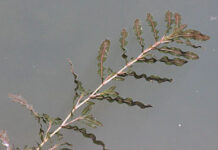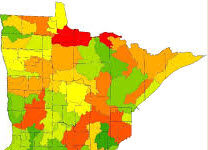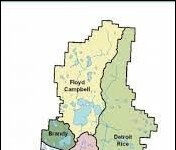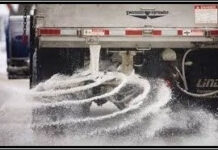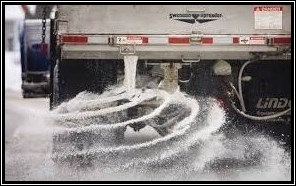Minnesota is blessed with abundant water resources. The state also experiences icy and snowy winters. This combination makes it tough for road authorities to balance the need to make roads safe for drivers with the need to protect lakes and streams from road salt runoff.
The Minnesota Pollution Control Agency (MPCA) and Department of Transportation (MnDOT) addressed that balance at the 19th Annual Road Salt Symposium on Thursday, October 24 in Vadnais Heights. Katrina Kessler, assistant MPCA commissioner for water, and Sue Mulvihill, MnDOT deputy commissioner and chief engineer, provided opening comments for the event.
Minnesota has a growing salty water problem that threatens its freshwater fish and other aquatic species. Chloride, from road salt runoff and other sources, is building up in Minnesota waters. Long-term monitoring by the MPCA and its partners shows that chloride is increasing in waters across the state, meaning it’s not just a Twin Cities problem.
It takes only 1 teaspoon of salt to make five gallons of water permanently toxic to fish and other aquatic life. That’s why it’s critical to reduce road salt at the source, and prevent it from contaminating lakes and streams; there’s no feasible way to remove chloride from water and it doesn’t break down over time.
The MPCA recognizes the need to keep roads safe for drivers and sidewalks for pedestrians. One way to balance the need for safety with the need to reduce chloride is through optimal use of salt, which reduces the amount applied and saves on costs. The MPCA has developed several resources for road authorities, property managers, and citizens, including Smart Salting training, model policies for cities, and a Statewide Chloride Management Plan that offers several resources for government units and winter maintenance workers.
“The challenges with chloride are complex, requiring us to collaborate to protect our water resources and maintain safe roads, parking lots, and sidewalks,” Kessler says. “MPCA will continue to look for opportunities to provide assistance to our partners in reducing chloride.”
MnDOT presented at the symposium on alternatives to road salt for de-icing roads. Mayo Clinic was on hand to discuss its recent steps to reduce salt use while maintaining safety. The University of Minnesota presented its chloride research.
For more information about the Road Salt Symposium, visit the Fresh Water Society web site.

